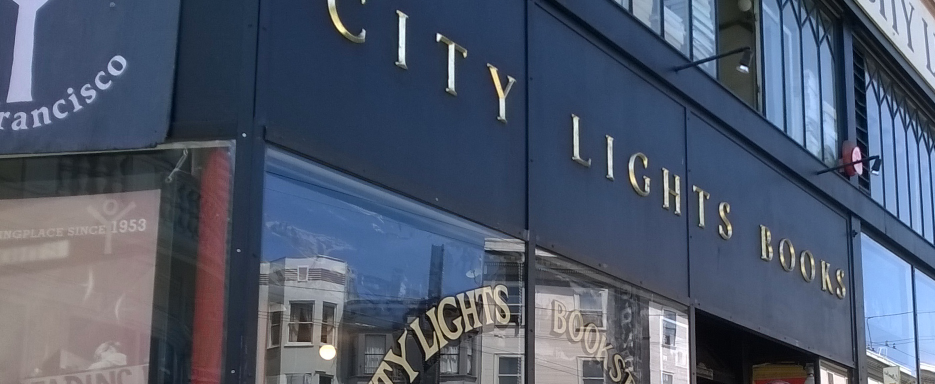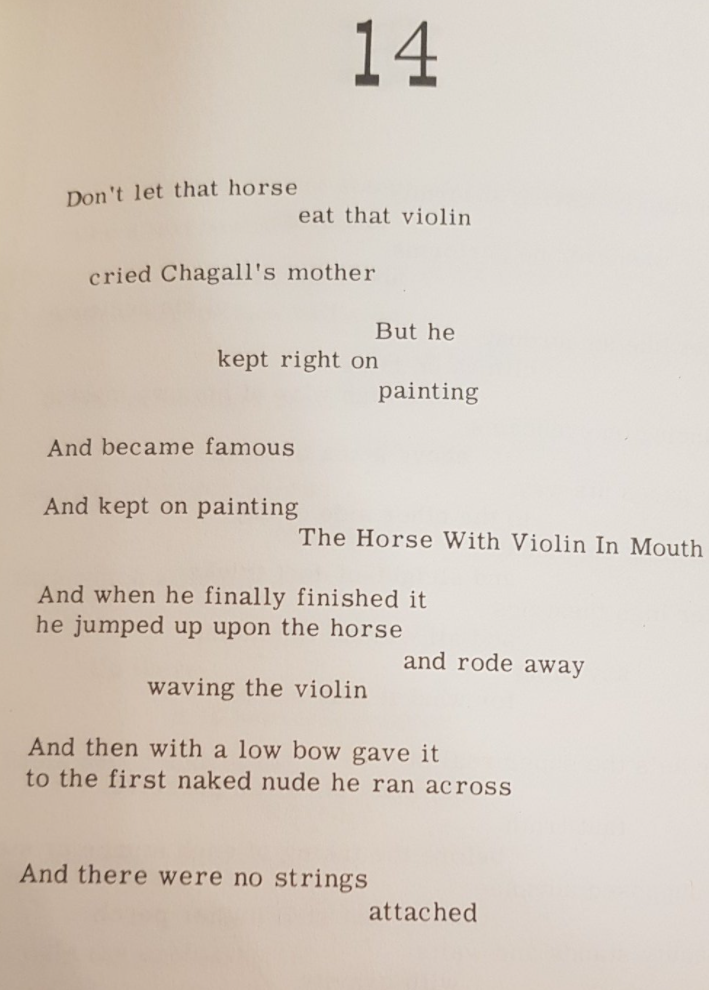Our English and Creative Writing lecturers pick some some significant poems for World Poetry Day
Kate Tempest: Brand New Ancients (2013)—The New Waste Land.
If you invest in just one poetry collection this year, get Brand New Ancients by Kate Tempest. In fact, it is not a collection—rather, a long poem which bounds with vociferous energy over its forty-seven pages. The book begins with an aphoristic inscription: “This poem was written to be read aloud”, and to read it alongside a recording of Tempest’s virtuosic spoken-word performance is enthralling.
The text begins with a meditation on myth:
In the old days
the myths were the stories we used to explain ourselves.
But how can we explain the way we hate ourselves,
the things we’ve made ourselves into,
the way we break ourselves in two,
the way we overcomplicate ourselves?
But we are still mythical. (Tempest, 2013, p.1)
Note the lexical stride of ‘ourselves’ as it shifts its syntactical position in each line, much like the shifting of our own subjectivity, culture and the passing of time: a civilization taking one step forward and two steps back.
In this next passage, assonant sonority meanders through these phrases like a soundwave where ‘your’/ ‘distorted’ and ‘moss’/’emboss’, ‘rock’/work’ curl subtle filigrees against the more stoic, conventional rhyming of ‘loathing/clothing’ at the lines’ end. Generous, round vowels evoke gravitas and the echo of deep, ancient time:
[. . .] Kevin, your altar is covered in moss,
the inscription distorted, embossed long ago, it said once—
stay true, even if others do not.
He breaks through the rock of his silent self-loathing,
climbs into his clothing
and heads off to work. [. . .] (Tempest, 2013, p.8)
Tempest is not the first poet to gaze into the antique past, to myth and the Classical world, in order to explain ‘ourselves’. T.S. Eliot’s monolithic poem, The Waste Land (1922), too is a collage of intertexts which crisscross through Dante, Shakespeare, ancient Buddhist scripture, but also popular songs and lewd limericks. Part II of the Waste Land, ‘A Game of Chess’, dramatises the unhappy marriages of two couples, inflected with allusions to Anthony and Cleopatra, Dido and Aeneas, Elizabeth I and Leicester. Tempest, in her narrative poem, renders the relationships of two families with Eliotian pessimism, but not in the manner of pastiche. Tempest layers her own careful palimpsest of lyric pathos, dramatic epic, and their modern-day reincarnations: street poetry and rap. She glissades easily between speech, recitative and song in stiches so rhythmically complex they defy traditional scansion.
Brand New Ancients is, perhaps, the Waste Land of our age.
Lisa Mansell
My grandma died on the 16th of March 2017 and it was a strangely hot day. It took her a long time to die. And while I waited I read a lot of poetry.
I wrote a creative non-fiction essay in part about her death called ‘The Familiar Absence of Words.’ Here is a brief extract:
I stayed with grandma for most of that day and read from a poetry book. The words were soothing. Love and loss are easier on a page: less ragged than real life. I read in bursts to the noise of grandma’s rasping breaths and paused during the worrying silences in between. I read with intensity: I held the book like a bible.
This was one of the poems I read as my grandma lay dying.
Detail
Eamon Grennan
I was watching a robin fly after a finch — the smaller bird
chirping with excitement, the bigger, its breast blazing, silent
in light-winged earnest chase — when, out of nowhere
over the chimneys and the shivering front gardens,
flashes a sparrowhawk headlong, a light brown burn
scorching the air from which it simply plucks
like a ripe fruit the stopped robin, whose two or three
cheeps of terminal surprise twinkle in the silence
closing over the empty street when the birds have gone
about their own business, and I began to understand
how a poem can happen: you have your eye on a small
elusive detail, pursuing its music, when a terrible truth
strikes and your heart cries out, being carried off.
You can read the full essay ‘The Familiar Absence of Words’ here.
Hannah Stevens
A Refusal to Mourn the Death, by Fire, of a Child in London
Dylan Thomas
Never until the mankind making
Bird beast and flower
Fathering and all humbling darkness
Tells with silence the last light breaking
And the still hour
Is come of the sea tumbling in harness
And I must enter again the round
Zion of the water bead
And the synagogue of the ear of corn
Shall I let pray the shadow of a sound
Or sow my salt seed
In the least valley of sackcloth to mourn
The majesty and burning of the child’s death.
I shall not murder
The mankind of her going with a grave truth
Nor blaspheme down the stations of the breath
With any further
Elegy of innocence and youth.
Deep with the first dead lies London’s daughter,
Robed in the long friends,
The grains beyond age, the dark veins of her mother,
Secret by the unmourning water
Of the riding Thames.
After the first death, there is no other.
The renowned critic, Terry Eagleton, argues of this poem that ‘the imagery … is largely at a tangent to the poem’s official subject’, and goes on to say how much he dislikes it. But isn’t this to miss the point of Thomas’s refusal and the anti-elegiac ambition of the verse? We have here 4 tightly structured sestets of rigid line-length and rhyme structure, giving the feeling of the conventional poetry of famous elegists such as Milton and Shelley. We become aware of the challenge to the conventions of the form in the long first line that takes us, breathlessly, from the opening, resistant ‘Never…’ into the 3rd stanza. It is only here, in the 13th line of the poem, that the girl killed by the fire bombing of London becomes the subject of the poem; this line becomes the pivot of Thomas’s contemplation of time and loss. Once acknowledged, the site and manner of the girl’s death, in the underground stations where Londoners sheltered from the bombers, she becomes London’s daughter, buried with the city’s innumerable dead and the earth of the city takes her back as a mother. The symbolism of the poem draws attention to the condensation of time into these moments of loss: Thomas records how he enters the ‘Zion of the water bead’ and ‘the synagogue of the ear of corn’ to show how nature contains all of time.
Thomas defers the lamentation of the dead girl to the second half of the poem to illustrate the futility of attempting to capture the tragedy of this loss – one of so many in the war – in the form of a poem. He ‘shall not murder’ her again, he insistently tells us, with an ‘Elegy of innocence and youth’.
Dylan’s anti-elegy records the loss of the girl in the blitz but as her death is insignificant in the scale of the war and the immensity of time, he is unable to offer consolation.
Mark Brown
Here is a great old-fashioned Romantic poem by Thomas Hardy: The Darkling Thrush. I love this poem because it spoke to me when I was about 12 and in no way a reader of poetry. When I say ‘spoke to me’, I mean it spoke of things that had, up till then, been only the vague and unfocused experience of my own life. It was a surprise to read, for example, that ‘The land’s sharp features seemed to be the century’s corpse outleant’ and to realise that somebody else (a dead poet) had once felt a rocky landscape, like the ones I knew from the Welsh mountains, to be an ancient body. The ‘century’s corpse‘ gives this image a stronger connection with human life (our artificial slicing up of infinite time into hundreds of years). And this corpse is then made even more human by the addition of cloud and wind: ‘His crypt the cloudy canopy, The wind his death-lament‘.
That ordinary landscape could express the whole drama of human life so clearly and directly seemed magical to me. And that is just in one of the verses. How about the next bit: ‘The ancient pulse of germ and birth was shrunken hard and dry’? What is the ‘ancient pulse’? It doesn’t exist, except in our own sense of what life is. Dylan Thomas, in another great nature poem, called it ‘the force’. The title alone is a poem: ‘The force that through the green fuse drives the flower’. Learn these two poems and they will stay with you for life: every winter, every spring, you’ll communicate with these two long dead voices.
The Darkling Thrush
Thomas Hardy
I leant upon a coppice gate
When Frost was spectre-grey,
And Winter’s dregs made desolate
The weakening eye of day.
The tangled bine-stems scored the sky
Like strings of broken lyres,
And all mankind that haunted nigh
Had sought their household fires.
The land’s sharp features seemed to be
The Century’s corpse outleant,
His crypt the cloudy canopy,
The wind his death-lament.
The ancient pulse of germ and birth
Was shrunken hard and dry,
And every spirit upon earth
Seemed fervourless as I.
At once a voice arose among
The bleak twigs overhead
In a full-hearted evensong
Of joy illimited;
An aged thrush, frail, gaunt and small,
In blast-beruffled plume,
Had chosen thus to fling his soul
Upon the growing gloom.
So little cause for carolings
Of such ecstatic sound
Was written on terrestrial things
Afar or nigh around,
That I could think there trembled through
His happy good-night air
Some blessed Hope, whereof he knew
And I was unaware.
Margaret Leclere



